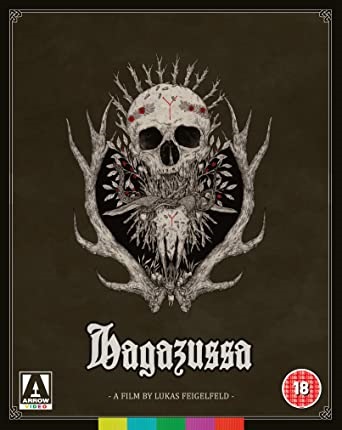Was witchhood a vocation in the Middle Ages or, as seems more likely, a charge levelled at sick or troublesome women by superstitious neighbours anxious to be rid of them? One of the merits of the gravely beautiful folk horror film Hagazussa is the way it shows a young Alpine woman of the 15th century committing unspeakable acts not because occult practices run in her family, as the locals believe, but because she is psychotic.
The Austrian writer-director Lukas Feigelfeld’s full-length debut begins with the pre-pubescent Albrun (Celina Peter) observing the agonising decline of her middle-aged single mother (Claudia Martini). Denounced as a witch by nightcallers dressed in goatskins, she develops suppurating lumps on her back, molests Albrun in bed, and is soon found dead beside a stagnant lake. Years pass and Albrun (played as a watchful, trusting adult by the extraordinary Polish actress Aleksandr Cwen) is a 25-ish unwed mother of a newborn and the owner of a few goats that provide her with a living. Their milk flowing through her fingers and their warm fur meanwhile stimulate her to masturbate in a way that sinisterly echoes her mother’s sexual abuse of her.
 Summoned by a priest to his ossiary, Albrun is warned by him that “all sacrilege must be cleansed” and given her mother’s decorated skull, which she makes the centre of a shrine in her cabin. After Swinda (Tanja Petrovsky), her only acquaintance, contrives Albrun’s rape by a labourer, Albrun infects the village water supply. A black-hooded man, not unlike the one in Breugel the Elder’s The Misanthrope, wheels Swinda’s naked corpse to a burial pit, where Albrun sees that other locals have become collateral damage. By now she has lost her moorings. After sampling a creaturely mushroom, she wades into the stagnant pond, her baby at her breast, and hallucinates. Cinematographer Mariel Baqueiro renders Albrun's trip with dazzling psychedelic authenticity. But Hagazussa is less an eldritch fantasy than a responsible study of hereditary mental illness and its stigmatization by the narrow-minded.
Summoned by a priest to his ossiary, Albrun is warned by him that “all sacrilege must be cleansed” and given her mother’s decorated skull, which she makes the centre of a shrine in her cabin. After Swinda (Tanja Petrovsky), her only acquaintance, contrives Albrun’s rape by a labourer, Albrun infects the village water supply. A black-hooded man, not unlike the one in Breugel the Elder’s The Misanthrope, wheels Swinda’s naked corpse to a burial pit, where Albrun sees that other locals have become collateral damage. By now she has lost her moorings. After sampling a creaturely mushroom, she wades into the stagnant pond, her baby at her breast, and hallucinates. Cinematographer Mariel Baqueiro renders Albrun's trip with dazzling psychedelic authenticity. But Hagazussa is less an eldritch fantasy than a responsible study of hereditary mental illness and its stigmatization by the narrow-minded.
Feigelfield says he is influenced by art – he owes greatly to the German Romantic painter David Caspar Friedrich – and such directors as FW Murnau, Krzysztof Zanussi and Andrei Tarkovsky. Certainly the latter’s elliptical travelling shots over submerged detritus in Stalker affected how Allbrun was filmed wading through a swamp and climbing uphill in a snowbound wood laden with metaphysical import. The art-house classic that Hagazussa recalls most, however, is Repulsion, Roman Polanski’s harrowing 1965 study of a young woman whose androphobia is rooted in her childhood relationship with her father. Born in 1986, Feigelfeld has made a late start as a feature director, but his future couldn’t be more promising.
Among the extras on Arrow Video’s limited edition Hagazussa Blu-ray are Feigelfeld’s 2013 shorts Betan and Interferenz, select scene commentaries by him, and a CD of the Greek dark ambient collective MMMD’s doomy score. Film critic Kat Ellinger provides the audio commentary.















Add comment